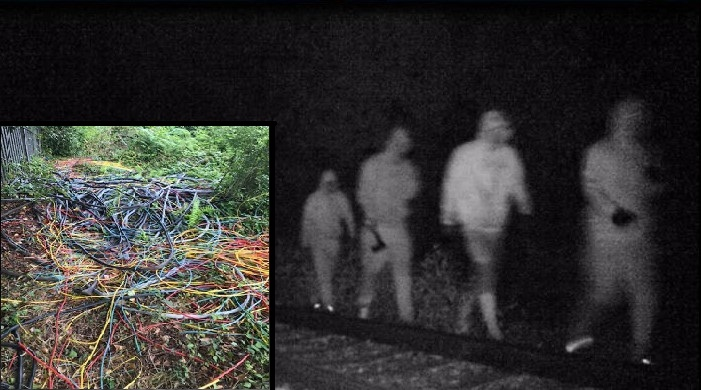Wednesday 12 Jul 2023
Network Rail and British Transport Police double arrests of cable theft criminals as cost to taxpayer exceeds £1m in last six months
- Region & Route:
- Wales & Western: Wales & Borders
Stepped up security, drones and forensic marking agents have led to seven arrests since January 2023 as the rail industry cracks down on dangerous, disruptive and costly crime.
The theft of metal, particularly cables, from the railway is a significant issue for the rail industry, which has cost taxpayers £1.1m in Wales and Borders route, since January 2023.
However, Network Rail’s new and improved ways of tackling cable theft is making it easier to identify and catch criminals, seven arrests since January 2023 - double that of previous years with three arrests in 2020 followed by another three in 2021.
Network Rail has adopted new and improved ways of cracking down on cable theft on the railway, including:
- funding British Transport Police officers
- using overt and covert security cameras to alert that people are on the network and to support the police
- incorporating drones to help with increasing patrols
- installing new ways of securing cables
- using forensic marking agents to track thieves
- introducing cables which are harder to steal and easier to identify
- and setting up a dedicated security team.
It’s not just cables, however. The theft of metal is a big problem for the railway as thieves also target overhead power lines and even metal fences to sell for scrap.
Network Rail is working with the wider industry and scrap metal dealers to prevent stolen cable being sold as part of the Scrap Metal Dealers Act 2013:
- scrap metal dealers must be licensed, and local authorities have the power to refuse unsuitable applicants and revoke licenses
- police have the power by court order to close unlicensed scrap yard
- all sellers of metal must show verifiable ID which dealers must record and retain
- cash trades for scrap metal are illegal without exception and subject to unlimited fines
- a public national register of scrap metal dealers has been created.
This will help make sure the sale of scrap metal is accounted for and all people trading scrap are doing so legitimately.
Britain’s rail network is designed to fail safe, which means that when a cable is cut trains are brought to a standstill. This protects passengers but can lead to lengthy, frustrating delays while the problem is found and fixed safely.
A large proportion of Network Rail’s funding comes from the Government, so these thefts are, ultimately, costing taxpayers money.
Although the majority of thefts took place in South Wales, Network Rail is unable to provide specific locations due to pending trials, ongoing investigations and security.
Andy Armstrong, programme manager for route crime and security for Network Rail Wales & Borders, said: “This increase in arrests and convictions is a welcome half-way-marker to 2023. Cable theft costs Network Rail millions of pounds each year. The total cost to the economy – taking into account the impact of freight delays to power stations and supermarkets, and on passengers whose journeys are disrupted – is even higher.
“We are working with the BTP and wider industry to crack down on cable theft, as well as other metal theft. Our adoption of new technologies has already seen an increase in arrests and convictions, and we will continue to improve security and ensure that the railway can run safely, securely and reliably.”
British Transport Police National Lead for Metal Crime, Superintendent Mark Cleland, said: “BTP are working closely with the rail industry, the waste industry and partners including the joint unit for waste crime and the national economic crime centre to target those who see an opportunity to make money from stealing metal.
“Metal crime is highly disruptive to the UK economy and the actions of those who steal metal can put their own lives and others lives at risk. BTP continue to run numerous operations targeting organised criminality ensuring we seek convictions and confiscate all assets to ensure no one can profit from this crime.
“In the last two years alone, hundreds of arrests have been made and millions of pounds recovered from offenders with numerous multi-year convictions proving that any targeting of national infrastructure has severe implications to those who decide to test our ability to catch them.”
Contact information
Passengers / community members
Network Rail national helpline
03457 11 41 41
Latest travel advice
Please visit National Rail Enquiries
Journalists
Callum Jones
callum.jones2@networkrail.co.uk
About Network Rail
We own, operate and develop Britain's railway infrastructure; that's 20,000 miles of track, 30,000 bridges, tunnels and viaducts and the thousands of signals, level crossings and stations. We run 20 of the UK's largest stations while all the others, over 2,500, are run by the country's train operating companies.
Usually, there are almost five million journeys made in the UK and over 600 freight trains run on the network. People depend on Britain's railway for their daily commute, to visit friends and loved ones and to get them home safe every day. Our role is to deliver a safe and reliable railway, so we carefully manage and deliver thousands of projects every year that form part of the multi-billion pound Railway Upgrade Plan, to grow and expand the nation's railway network to respond to the tremendous growth and demand the railway has experienced - a doubling of passenger journeys over the past 20 years.
Follow us on Twitter: @networkrail
Visit our online newsroom: www.networkrailmediacentre.co.uk

